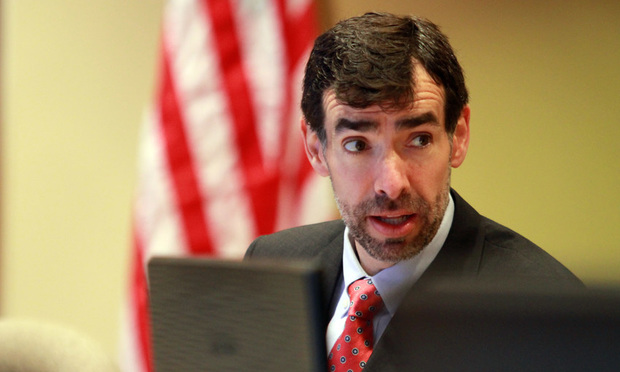Chief Judge Defends Survey Critics Decry as 'Plot' to Dismantle Fulton Family Court
Fulton County Superior Court Chief Judge Robert McBurney said the survey was a routine effort to monitor the court's effectiveness, and dismissed rumors that there was any plan to abolish the Family Division.
May 31, 2019 at 05:00 PM
4 minute read
 Judge Robert McBurney, Fulton County Superior Court. Credit: John Disney/ALM
Judge Robert McBurney, Fulton County Superior Court. Credit: John Disney/ALM
Fulton County Superior Court Chief Judge Robert McBurney blasted critics of a survey seeking input on the operations of the court's Family Division as peddling an “alarmist” misinterpretation of the exercise.
Those critics, including attorneys, ministers and a Fulton County commissioner, on Friday released a statement expressing “strenuous opposition to the clandestine attempt by some lawyers and some judges” to “dismantle the Fulton Family Division and to revert to the practice of handling Family Law cases utilized years ago.”
But McBurney said the survey was a routine effort to monitor the court's effectiveness, and dismissed rumors that there was any plan to abolish the Family Division.
“There's a smart plan in place to gather information about the court,” McBurney said Friday. “It's a shame that some people have mischaracterized it. The Family Division is very much alive; whether it is alive and well is a matter for debate.”
McBurney said he and his fellow judges recently asked the family law sections of the State Bar of Georgia and the Atlanta Bar Association to circulate the online survey to their members.
The survey asked respondents to rate whether the division improved or declined over the last five years and whether they support doing away with it and returning its duties to all 20 judges, among other questions.
“We wanted to get some feedback: 'How are we doing? What can we do differently? What can we do better,'” McBurney said. “It's an unremarkable event aimed at improving performance.”
Not everyone saw it as such, including the coalition that sought to sound an alarm about the survey.
The survey's critics said that before the Family Division's creation in 1998, family court cases were assigned to all the court's judges, just as civil and criminal cases are, and “family law cases took bottom rung priority in granting hearings on child support, child custody, pressing immediate matters of protective hearings, and the like. Many of the judges were ill-equipped to handle family matters and had an obvious distaste for handling family law cases.”
“Fast forward to today, the motivation of some lawyers and some ill-informed judges who may lack the historical perspective[] is to seek to dismantle the Family Division and to reverse the clock,” said the statement.
Among its signatories are former Superior Court Judge Thelma Wyatt Moore; Fulton County Commissioner Marvin Arrington Jr.; Rev. Gerald Durley; Rev. Timothy McDonald and attorneys George O. Lawson, Janise Miller, Susan Ockleberry and Antavious Weems.
Moore, who retired in 2008, said she well remembered the days before the division's creation.
“When I first came to the Superior Court bench in 1990, we handled Family Division cases while criminal cases were being negotiated for pleas,” she said. “We needed people … who were trained in family law, and who received continuous training.”
Lawson said he has been a member of the bar's Family Law Section since its inception, but was unaware of the survey until another lawyer mentioned it to him.
“It was supposedly sent out to family practitioners, but I never got it,” he said.
Lawson said he'd spoken to McBurney about the survey to express his concerns.
“There are more pro se litigants in Family Court than in any other court expect Magistrate Court,” Lawson said. “I told Judge McBurney that families in crisis need immediate attention for things like child support, custody hearings. I don't understand the rationale for going back to the old way.”
“The answer is that this is nothing more than information-gathering,” McBurney said.
The responses are still being complied and afterward “we'll need to work through what we do with the results,” he said. “We're just excited because it seems like we're getting a lot of practitioners offering up their perspectives. We like to provide opportunities for the bar to respond to the bench.”
This content has been archived. It is available through our partners, LexisNexis® and Bloomberg Law.
To view this content, please continue to their sites.
Not a Lexis Subscriber?
Subscribe Now
Not a Bloomberg Law Subscriber?
Subscribe Now
NOT FOR REPRINT
© 2025 ALM Global, LLC, All Rights Reserved. Request academic re-use from www.copyright.com. All other uses, submit a request to [email protected]. For more information visit Asset & Logo Licensing.
You Might Like
View All
Georgia Republicans Push to Limit Lawsuits. But Would That Keep Insurance Rates From Rising?
5 minute read
A Plan Is Brewing to Limit Big-Dollar Suits in Georgia—and Lawyers Have Mixed Feelings
10 minute readTrending Stories
- 1An Eye on ‘De-Risking’: Chewing on Hot Topics in Litigation Funding With Jeffery Lula of GLS Capital
- 2Arguing Class Actions: With Friends Like These...
- 3How Some Elite Law Firms Are Growing Equity Partner Ranks Faster Than Others
- 4Fried Frank Partner Leaves for Paul Hastings to Start Tech Transactions Practice
- 5Stradley Ronon Welcomes Insurance Team From Mintz
Who Got The Work
J. Brugh Lower of Gibbons has entered an appearance for industrial equipment supplier Devco Corporation in a pending trademark infringement lawsuit. The suit, accusing the defendant of selling knock-off Graco products, was filed Dec. 18 in New Jersey District Court by Rivkin Radler on behalf of Graco Inc. and Graco Minnesota. The case, assigned to U.S. District Judge Zahid N. Quraishi, is 3:24-cv-11294, Graco Inc. et al v. Devco Corporation.
Who Got The Work
Rebecca Maller-Stein and Kent A. Yalowitz of Arnold & Porter Kaye Scholer have entered their appearances for Hanaco Venture Capital and its executives, Lior Prosor and David Frankel, in a pending securities lawsuit. The action, filed on Dec. 24 in New York Southern District Court by Zell, Aron & Co. on behalf of Goldeneye Advisors, accuses the defendants of negligently and fraudulently managing the plaintiff's $1 million investment. The case, assigned to U.S. District Judge Vernon S. Broderick, is 1:24-cv-09918, Goldeneye Advisors, LLC v. Hanaco Venture Capital, Ltd. et al.
Who Got The Work
Attorneys from A&O Shearman has stepped in as defense counsel for Toronto-Dominion Bank and other defendants in a pending securities class action. The suit, filed Dec. 11 in New York Southern District Court by Bleichmar Fonti & Auld, accuses the defendants of concealing the bank's 'pervasive' deficiencies in regards to its compliance with the Bank Secrecy Act and the quality of its anti-money laundering controls. The case, assigned to U.S. District Judge Arun Subramanian, is 1:24-cv-09445, Gonzalez v. The Toronto-Dominion Bank et al.
Who Got The Work
Crown Castle International, a Pennsylvania company providing shared communications infrastructure, has turned to Luke D. Wolf of Gordon Rees Scully Mansukhani to fend off a pending breach-of-contract lawsuit. The court action, filed Nov. 25 in Michigan Eastern District Court by Hooper Hathaway PC on behalf of The Town Residences LLC, accuses Crown Castle of failing to transfer approximately $30,000 in utility payments from T-Mobile in breach of a roof-top lease and assignment agreement. The case, assigned to U.S. District Judge Susan K. Declercq, is 2:24-cv-13131, The Town Residences LLC v. T-Mobile US, Inc. et al.
Who Got The Work
Wilfred P. Coronato and Daniel M. Schwartz of McCarter & English have stepped in as defense counsel to Electrolux Home Products Inc. in a pending product liability lawsuit. The court action, filed Nov. 26 in New York Eastern District Court by Poulos Lopiccolo PC and Nagel Rice LLP on behalf of David Stern, alleges that the defendant's refrigerators’ drawers and shelving repeatedly break and fall apart within months after purchase. The case, assigned to U.S. District Judge Joan M. Azrack, is 2:24-cv-08204, Stern v. Electrolux Home Products, Inc.
Featured Firms
Law Offices of Gary Martin Hays & Associates, P.C.
(470) 294-1674
Law Offices of Mark E. Salomone
(857) 444-6468
Smith & Hassler
(713) 739-1250








